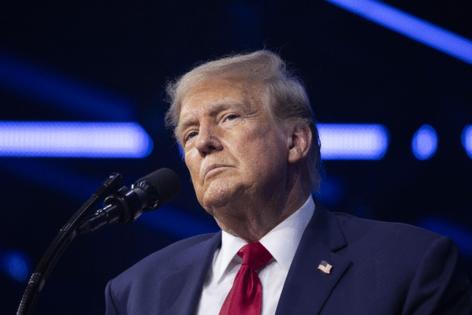Trump as president or private citizen: Why Supreme Court's immunity ruling is a test
Published in News & Features
The U.S. Supreme Court will rule Monday on Donald Trump’s claim that he’s immune from criminal charges over attempts to overturn the 2020 election, with a strong possibility the case will be kicked back to a lower court for more legal wrangling.
The court’s view may boil down to this: Was he acting as president or as a private citizen?
Some of the nine justices indicated during oral arguments April 25 that in their view, former presidents can be prosecuted, but only over private conduct while in office. Several justices — including Chief Justice John Roberts — discussed asking the lower court to take a closer look at the allegations to distinguish what is part of a president’s job and what isn’t.
A mixed ruling would be a challenge for Special Counsel Jack Smith, potentially narrowing his historic case and preventing it from going to trial before Trump’s November rematch against President Joe Biden. And if he wins, Trump could order the Justice Department to drop the case.
But any ruling that keeps the case alive is a setback for Trump too, leaving the former president at risk of criminal charges that could result in years behind bars.
The justices indicated they may send the case back to U.S. District Judge Tanya Chutkan, who is overseeing the case. Presidents already enjoy civil immunity for “all acts within the ‘outer perimeter”’ of official duties,” according to a 1982 Supreme Court ruling in an unrelated case. But the court hasn’t weighed whether a president is immune from criminal charges.
“The allegations in the pending indictment seem directed mostly at Trump’s conduct as a candidate, as opposed to his conduct as president,” said former federal prosecutor Barbara McQuade, adding that Smith could have an easy fix if any rulings went against the government. “Depending on where the court draws the line, Jack Smith would have the option of deleting from the indictment any conduct that might arguably be immune from prosecution.”
Smith and his prosecutors said decisions about which actions can be prosecuted should be worked out as the case is brought to trial — through rulings by the judge and jury instructions. Smith’s team said in a legal filing they should be able to reference official acts during trial, even if those acts can’t be prosecuted.
The justices, however, have already expressed skepticism toward Trump’s sweeping argument that the indictment should be dismissed because it relies heavily on his official actions following the 2020 election. Trump says he was trying to prevent what he alleged without evidence was a rigged election.
The key to determining what’s private versus official may come down to an earlier analysis of Trump’s conduct by an appeals court, in parallel civil litigation over the Jan. 6 riot. In those cases, the appeals court rejected Trump’s request for immunity from civil lawsuits over his conduct in office and he didn’t ask the Supreme Court to intervene.
...continued
©2024 Bloomberg L.P. Visit bloomberg.com. Distributed by Tribune Content Agency, LLC.







Comments